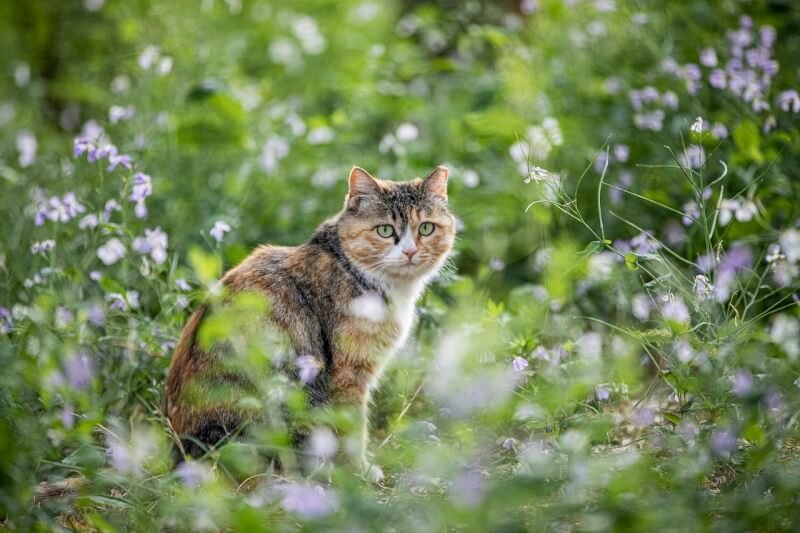You love your furry feline friend and want to ensure their safety while they enjoy the great outdoors. Creating a safe outdoor space for your cat is essential to protect them from potential dangers, while still allowing them to explore and play. From securing boundaries to providing stimulating elements, this article will guide you on how to create the perfect outdoor sanctuary for your beloved feline companion. So, let’s get started on transforming your yard into a cat-friendly haven!
Choosing the Right Outdoor Space
When it comes to creating a safe outdoor space for your cat, one of the first things to consider is the size of the area. Cats are naturally curious and love to explore, so ensuring that they have enough space to roam and play is essential. A small, cramped area may not provide enough stimulation for your furry friend, and they may become bored or frustrated. On the other hand, a large, open space may present its own set of challenges, such as potential dangers or difficulties in supervising your cat. Finding a balance between size and manageability is key.
In addition to considering the size of the space, it’s crucial to evaluate the safety of the surroundings. Take a look at the area and identify any potential hazards. Is there heavy traffic nearby? Are there poisonous plants or chemicals that your cat could come into contact with? Are there wild animals that could pose a threat? By ensuring your cat’s outdoor space is free from these dangers, you can provide a secure environment for them to explore and enjoy.
Creating Escape-Proof Boundaries
An essential aspect of creating a safe outdoor space for your cat is ensuring that the boundaries are escape-proof. Cats are known for their agility and ability to jump and climb, so it’s important to take steps to prevent them from wandering off or getting into dangerous situations.
Installing fencing around the perimeter of the outdoor space is an effective way to keep your cat contained. Make sure the fencing is high enough that your cat can’t jump over it, and that there are no gaps or holes that they could squeeze through. It’s also a good idea to check the fencing regularly for any damage or weak spots, as cats can be quite crafty when it comes to finding a way out.
In addition to fencing, creating overhead protection can add another layer of safety. This can be achieved by attaching netting or wire mesh above the outdoor space, effectively preventing your cat from climbing over the fence. By combining both fencing and overhead protection, you can create a secure boundary that will give you peace of mind.
Choosing Safe and Stimulating Toys
When your cat is spending time outdoors, providing them with safe and stimulating toys is essential. However, not all toys are created equal, and it’s important to choose ones that are suitable for outdoor use and won’t pose a risk to your cat’s safety.
Avoiding small or dangerous toys is crucial. Cats can easily swallow small objects, which can lead to choking or intestinal blockages. Look for toys that are specifically designed for cats and are large enough that they can’t be swallowed. Avoid toys with small parts that could break off and be ingested.
Opting for interactive toys is a great way to provide mental and physical stimulation for your cat. Toys that encourage play and allow your cat to engage their natural hunting instincts are ideal. Consider toys that involve chasing, pouncing, or interactive puzzles to keep your cat entertained and mentally engaged.
If your cat enjoys the effects of catnip, consider including some catnip toys in their outdoor play area. Catnip can be a great way to provide sensory stimulation and promote relaxation and playfulness in your cat. Just be sure to monitor their interaction with catnip toys to ensure they don’t become overly excited or possessive.
Ensuring Outdoor Safety Measures
Apart from creating a safe outdoor space, it’s crucial to take additional measures to ensure your cat’s overall outdoor safety. Regular veterinary check-ups are essential to detect any potential health issues early on. Your veterinarian can also provide guidance on outdoor safety tips specific to your cat’s needs and health conditions.
Parasite prevention is another important aspect of outdoor safety. Cats can come into contact with fleas, ticks, and other parasites while outdoors, which can lead to various health issues. Make sure to consult with your veterinarian about the appropriate preventive measures for your cat, such as flea and tick treatments.
In case your cat accidentally wanders off or gets lost while outside, it’s essential for them to wear a collar with identification. Include your cat’s name, your contact information, and any vital medical information on the collar tag. This will increase the chances of your cat being returned to you if they are found by someone else.
Supervising Outdoor Time
While creating a safe and secure outdoor space is important, it’s equally crucial to supervise your cat during their outdoor time. Starting with short outdoor sessions is recommended, especially if your cat is new to spending time outside. This allows them to gradually adjust to the new environment and ensures they won’t feel overwhelmed or anxious.
Monitoring your cat’s interactions with other animals is essential, especially if there are other cats or potentially aggressive animals in the vicinity. Keep a close eye on their behavior and step in if any signs of aggression or danger arise. Intervening early on can prevent potential fights or injuries.
Being mindful of weather conditions is also crucial when supervising your cat outdoors. Extreme heat or cold can pose risks to their health. Make sure to provide shade or shelter during hot weather and limit their outdoor time in extreme temperatures. Similarly, during cold weather, ensure they have a warm shelter or bring them indoors to avoid exposure to freezing temperatures.
By following these tips and taking necessary precautions, you can create a safe and enjoyable outdoor space for your cat. Remember to prioritize your cat’s safety and well-being, and always keep an eye out for any potential hazards or risks. With a little effort and care, you can provide a safe and stimulating environment for your furry friend to explore and enjoy the great outdoors.


